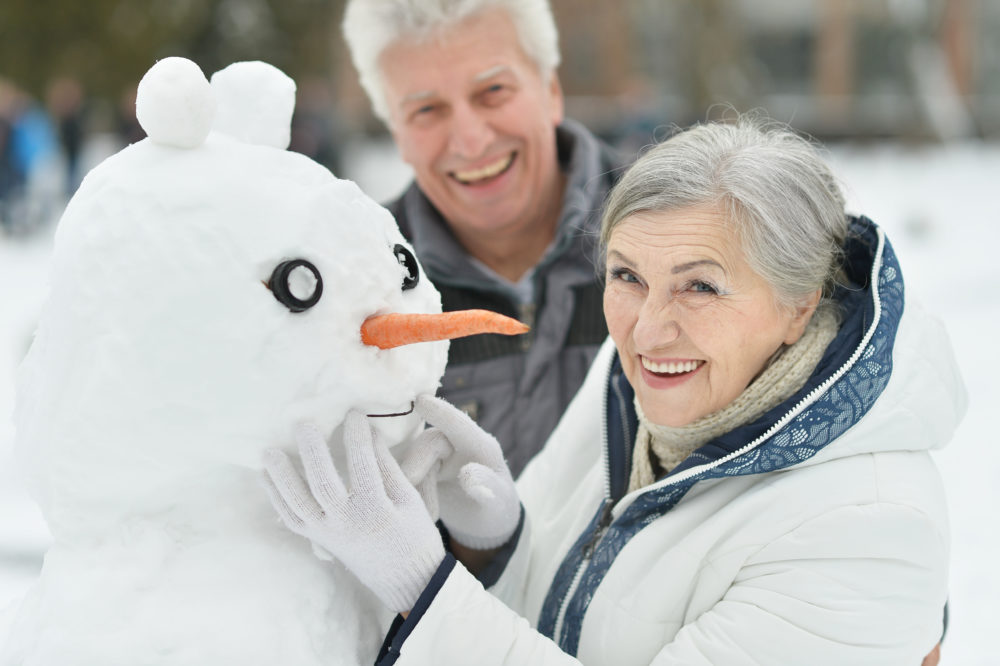Winter Tips for Seniors

Winter Tips for Seniors
During the winter months, ice, snow and cold temperatures can make life challenging for anyone. Slippery sidewalks and cold weather can cause a wide range of injuries and illnesses — especially for seniors.
As summarized in a recent article published on care.com, finding in-home care to assist you or your senior can help with safety during any season. In addition, here are seven specific ways to prevent common cold-weather dangers:
1. Avoid Slipping on Ice
Icy, snowy roads and sidewalks make it easy to slip and fall. “Unfortunately, falls are a common occurrence for senior citizens, especially during the winter months,” says Dr. Stanley Wang, a physician at Stanford Hospital in Palo Alto, Calif. “Often these falls cause major injuries such as hip and wrist fractures, head trauma and major lacerations.”
Make sure to wear shoes with good traction and non-skid soles, and try to stay inside until the roads are clear. Replace a worn cane tip to making walking easier. Take off shoes as soon as you return indoors because often snow and ice attach to the soles and, once melted, can lead to slippery conditions inside.
2. Dress for Warmth
Cold temperatures can lead to frostbite and hypothermia — a condition where the body temperature dips too low. According to the CDC, more than half of hypothermia-related deaths were of people over the age of 65.
So, don’t let indoor temperatures go too low and dress in layers. Going outside? Wear warm socks, a heavy coat, a warm hat, gloves and a scarf. In very cold temperatures, cover all exposed skin. Use a scarf to cover your mouth and protect your lungs. Your body temperature should never dip below 95 degrees — if it does get medical assistance immediately.
3. Fight Wintertime Depression
Because it can be difficult and dangerous to get around, many seniors have less contact with others during cold months. This can breed feelings of loneliness and isolation. To help avoid these issues, seniors might check with family members a bit more regularly, or agree upon a plan in which family members can check in more often; you might also arrange for in-home care or companionship, or consider adult day care; a short, daily phone call can also make a big difference. Seniors can also arrange a check-in system with neighbors and friends, where each person looks in on one or two others daily.
4. Check the Car
Driving during the winter can be hazardous for anyone. But it is especially dangerous for seniors who may not drive as often or whose reflexes may not be as quick as they once were. Get your car serviced before wintertime hits or ask a family member to bring it to a garage for you. Checking things like the oil, tires, battery and wipers can make a big difference on winter roads. Also make sure your AAA membership is up-to-date in case of emergencies.
5. Prepare for Power Outages
Winter storms can lead to power outages. Make sure you have easy access to flashlights and a battery-powered radio in case the power goes out. Stockpile warm blankets. Longer power outages can spoil the food in your refrigerator and freezer so keep a supply of non-perishable foods that can be eaten cold on hand. If the power goes out, wear several layers of clothing, including a hat. Move around a lot to raise your body temperature.
6. Eat a Varied Diet
Because people spend more time indoors and may eat a smaller variety of foods, nutritional deficits — especially Vitamin D deficiency — can be a problem. Try to eat foods that are fortified with Vitamin D, such as milk, grains and seafood options like tuna and salmon.
7. Prevent Carbon Monoxide Poisoning
Using a fireplace, gas heater or lanterns can lead to carbon monoxide poisoning. Ensure your safety by checking the batteries on your carbon monoxide detector and buying an updated one if you need to.
Recent News & Events
- Foundation Grants Help Revitalize Bethany’s Kitchen Facilities
- 2024 Spring Appeal Donations Bring the Comforts of Home to Bethany Residents
- Grants are Making a World of Difference for the Care of Bethany Residents
- A Family’s Gift Brings Daily Joy to Bethany Residents
- Bethany Will Host Upcoming Massachusetts Senior Care Association Workshop
